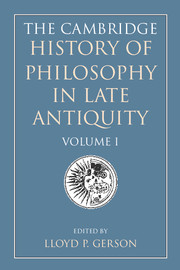Book contents
- Frontmatter
- General introduction
- I Philosophy in the later Roman Empire
- Introduction to Part I
- 1 The late Roman Empire from the Antonines to Constantine
- 2 The transmission of ancient wisdom: texts, doxographies, libraries
- 3 Cicero and the New Academy
- 4 Platonism before Plotinus
- 5 The Second Sophistic
- 6 Numenius of Apamea
- 7 Stoicism
- 8 Peripatetics
- 9 The Chaldaean Oracles
- 10 Gnosticism
- 11 Ptolemy
- 12 Galen
- II The first encounter of Judaism and Christianity with ancient Greek philosophy
- III Plotinus and the new Platonism
- IV Philosophy in the age of Constantine
- V The second encounter of Christianity with ancient Greek philosophy
- Map 1 The Byzantine Empire, c. 500
12 - Galen
from I - Philosophy in the later Roman Empire
Published online by Cambridge University Press: 28 May 2011
- Frontmatter
- General introduction
- I Philosophy in the later Roman Empire
- Introduction to Part I
- 1 The late Roman Empire from the Antonines to Constantine
- 2 The transmission of ancient wisdom: texts, doxographies, libraries
- 3 Cicero and the New Academy
- 4 Platonism before Plotinus
- 5 The Second Sophistic
- 6 Numenius of Apamea
- 7 Stoicism
- 8 Peripatetics
- 9 The Chaldaean Oracles
- 10 Gnosticism
- 11 Ptolemy
- 12 Galen
- II The first encounter of Judaism and Christianity with ancient Greek philosophy
- III Plotinus and the new Platonism
- IV Philosophy in the age of Constantine
- V The second encounter of Christianity with ancient Greek philosophy
- Map 1 The Byzantine Empire, c. 500
Summary
Galen is usually thought of as pre-eminently a medical man, and rightly so: he was the founder of a synthetic therapeutic and physiological doctrine of great power and elegance which was to become the dominant medical theory in the West and the Arab world for more than fifteen hundred years. But he considered himself a philosopher; indeed, for him the two vocations were indivisible. He wrote a short work entitled The Best Doctor is Also a Philosopher (Opt.med. 1.53–63 Kühn) with the aim of showing how a firm grounding in all three of the canonical branches of philosophy (logic, physics, ethics) was prerequisite to the proper practice of medicine, and in which he claimed, characteristically if eccentrically, that this doctrine had been anticipated by his great predecessor and pre-eminent role-model Hippocrates. Philosophical concerns are never far from the surface of his thought, even in his more particularly medical writing, a great deal of which survives (it is the largest surviving corpus of any ancient author) in the original Greek, while more is recoverable through translations into Arabic, Hebrew and Latin. So, although the tradition has been relatively unkind to his specifically philosophical output (which was also considerable), it is still possible to form a comprehensive and well-founded appreciation of his philosophical affinities and abilities. It is the task of this article to sketch such an appreciation.
- Type
- Chapter
- Information
- The Cambridge History of Philosophy in Late Antiquity , pp. 210 - 232Publisher: Cambridge University PressPrint publication year: 2000
- 2
- Cited by

